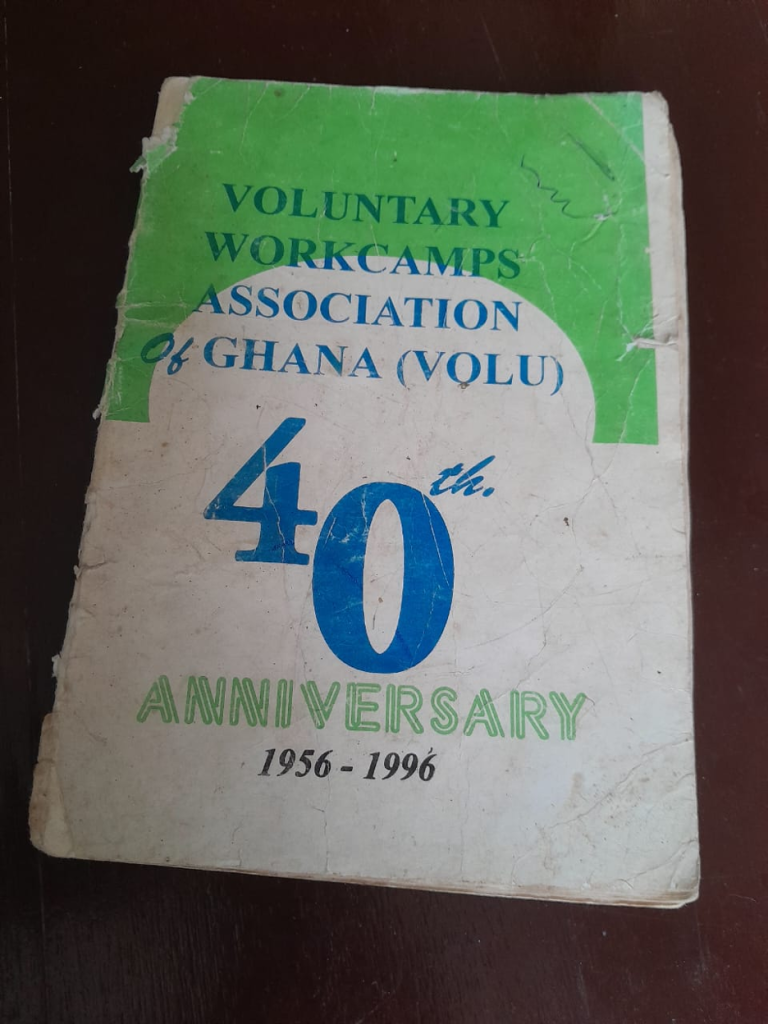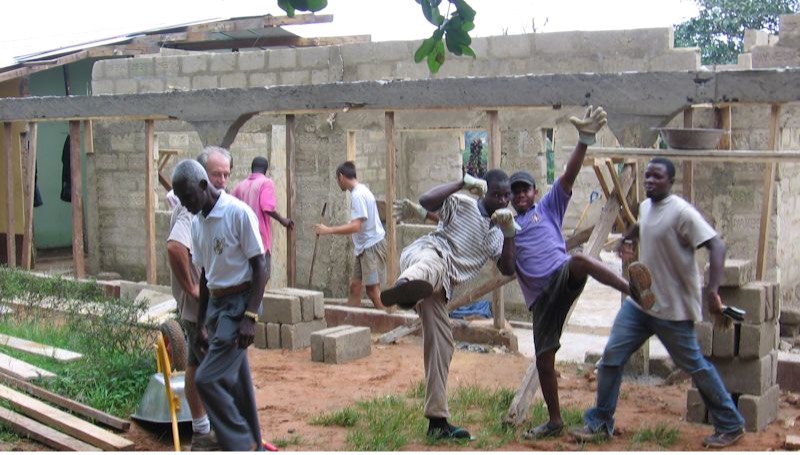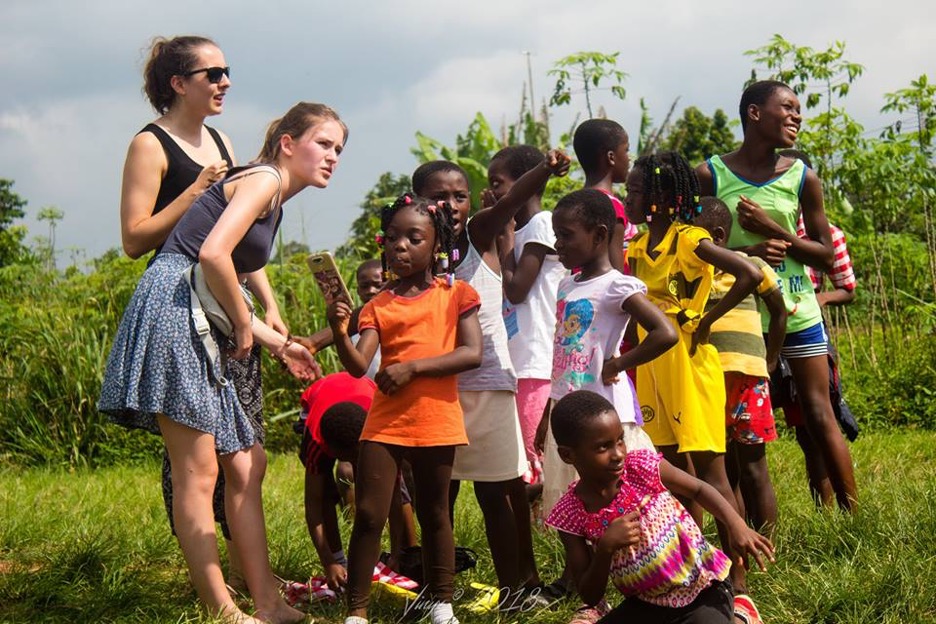Volunteerism
Volunteerism has always been at the heart of Hill House Meeting’s witness. In 1956, Quakers
promoted the formation of the Voluntary Workcamps Association (VOLU) for mobilising young people to support education, healthcare, sanitation, and community building. After Ghana’s independence, VOLU attracted more students as the need for community development became great.
- Young People – Join community workcamps and service projects.
- Schools & Universities – Partner with us to build service-learning into education.
- Faith & Civic Groups – Collaborate to revive community projects in health, literacy,
- and sanitation.
- Individuals – Share your skills, ideas, and time to support local needs.
The Story of VOLU
- 1954 – A pilot workcamp was held at Tsito in Awudome with the support of local chiefs, inspired by Gordon Green, an English teacher at Mfantsipim, and members of Hill House Friends.
- 1956 – VOLU was formally launched with the aim of rendering selfless service to
- mankind.
- 1960s–1990s – Workcamps flourished, attracting international partners such as the International Voluntary Service for Peace (IVSP) in London and Operations Crossroads Africa (USA).
- Impact – Schools, clinics, and sanitation projects were built; literacy and health education spread; and volunteers campaigned against youth vices like drug abuse and teenage pregnancy.
“We learn that big events often start from humble beginnings. This is certainly demonstrable in the life of VOLU.” — David Acquah, Hill House Friend & Patron of VOLU (1995)

After the Gold Coast attained independence in 1957, there was the need for more development projects. Apart from education, Quakers were involved in healthcare, and community development projects. Back in 1956, Quakers promoted the formation of Voluntary Workcamps Association to mobilise the youth to help in building community development projects. The aim of VOLU is to render selfless service to mankind by mobilising volunteers to contribute their energies for community development.

Over the years, VOLU diversified its activities by going into Literacy Programmes, Health and Environmental Education as well as campaign against youth vices such as drug abuse and teenage pregnancy.


How did VOLU begin? David Acquah a staunch Quaker of Hill House Meeting shared an account he wrote on the 40th anniversary of VOLU in 1996 Her second daughter, Janice Acquah reads part of the father’s speech for us on VOLU’s anniversary.
“ We learn that big events often start from humble beginnings. This is certainly demonstrable in the life of VOLU. In 1954, Quakers at the Hill House Friends Meeting at Achimota seized the opportunity to use the experience of (Gordon Green) a young expatriate teaching English at Mfantsipim School, Cape Coast to experiment with the innovation of promoting workcamps at Tsito in Awudome where an enlightened traditional chief was supportive of projects consistent with the objectives of adult education and community development.
On evaluating this workcamp experience, Quakers in Ghana decided to seek the assistance of the International Voluntary Service for Peace (IVSP) in London to train a Ghanaian prospective Medical Student to advance on the innovation of workcamps in this country. On return, he was to offer a year’s full time voluntary service as the Organising Secretary. Obviously, the success in promoting the concept of voluntary workcamps in Ghana, working in harmony together, had hit upon an idea whose time was ripe.
Its successes, even in the early days, VOLU became attractive to an (African American) United States Christian Minister who inspired the United States Operations Crossroads Africa to experiment with the services in African in co-operation with VOLU. Needless to say, this co-operation is only one of the many numerous international agencies which have helped to accord VOLU’s workcamps the international character they have always developed and maintained.
Little wonder, then that the international community, through their voluntary agencies and governments, have felt encouraged to work in close collaboration with the Ghana Government over the years to ensure that VOLU continues to flourish.”
That was part a speech David Acquah delivered as Patron of VOLU on 11th September 1995. Many friends from Hill House Meeting served VOLU in various capacities. Gordon Green was General Secretary, Mrs Alice Apea of SOS Children Village at Tema was a Vice President.
With changes of government and youth policies VOLU became inactive. But vacuum it filled in terms of community and youth development are still relevant and necessary.
HHM proposes to revive volunteerism in Ghana as established by Quakers. This is as follows:
o revitalize the Voluntary Workcamps Association of Ghana (VWAG) and mobilize youth for community development:
- Rebuild leadership and structure: Establish a strong leadership team and define a clear organizational structure.
- Update mission and vision: Align with current community needs and youth aspirations.
- Secure funding: Explore diverse funding sources.
- Youth mobilization: Utilize social media, community outreach, capacity building, and mentorship programs.
- Community development focus: Identify community needs, design and implement projects, engage communities, and assess impact.
- Partnerships: Collaborate with government agencies, civil society organizations, private sector, and international organizations.
Although there is no definitive metric to show level of voluntarism in Ghana, there is the need for it because of its numerous benefits. They include increased self-confidence building, emotional stability, physical and mental well-being, career development, and social capital. Hill that VOLU should not die off with a generation. There is the need to revive volunteering to meet the needs of the present day. This is why HHM has identified revival of volunteering as anniversary project. We would appreciate your ideas. Share them with us.
Thank you.

